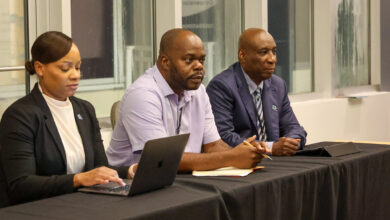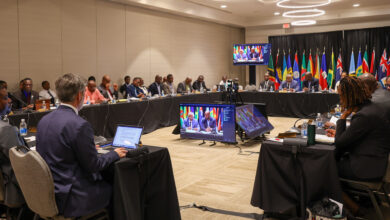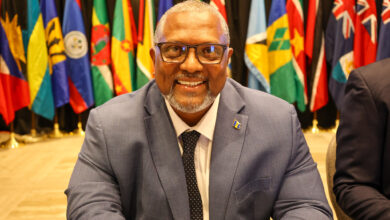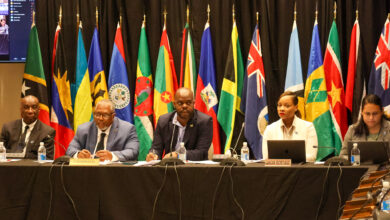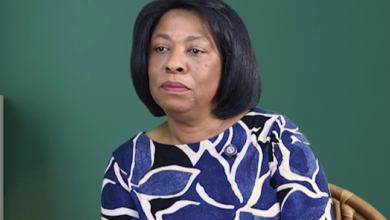Honourable Charles Savarin, Minister of Foreign Affairs, Trade, Labour and the Public Service of Dominica and Chairman of the COTED;
Honourable Eamon Courtenay, Minister of Foreign Affairs and Foreign Trade of Belize and Outgoing Chairman of the COTED;
Other Honourable Ministers;
Distinguished Delegates; Members of the Diplomatic Corps;
Other distinguished Guests;
Representatives of the Media;
Ladies and Gentlemen,
It is with great pleasure that I welcome you to this Twenty-Third Meeting of the Council for Trade and Economic development of the Caribbean Community. This is the first regular session of the Council since its last Meeting in November 2006. This has been due in large measure to the eventful first half of the year during which CARICOM experienced the successful first-ever hosting of the Cricket World Cup (CWC). This success was of course related more to the hosting rather than to our performance on the actual field of play!
That we are meeting in Saint Lucia today is the result of scheduling difficulties on the one hand and the generosity of the Government of Saint Lucia, on the other, which at very short notice agreed to host this Twenty-Third Meeting, in an effort to ensure maximum attendance of Ministers in light of a number of other events taking place here in this country. And for this and for the warm welcome and comfortable arrangements made for the Meeting, I wish to express our deep appreciation to the Government and people of Saint Lucia. From your attendance here also, Honourable Minister, it is evident that the objective of ensuring maximum participation has been achieved and I thank you for that.
Honourable Ministers, with only one day available, Officials worked well into the night to complete the preparations for your Meeting. They did so in the expectation that Ministers would be able to focus on arriving at the decisions required, with intensive discussion being necessary only in relation to those items which proved beyond the capacity of Officials to resolve. I wish to thank them sincerely for their yeoman effort.
The Agenda before you, Honourable Ministers, essentially deals with three broad areas – Issues relating to our intra-Community trade regime; the Nuts and Bolts in the implementation of the Single Market and the External Trade Relations of the Community.
Critical in our intra-Community Trade Regime is the growth and pattern of our intra-regional trade. Affecting this are a number of perennial issues in which progress has to be made, if only so that they do not continue to appear on the Agenda, meeting after meeting. They relate primarily to certain non-Tariff barriers which Member States have all agreed are inconsistent with their Treaty obligations. However, for one reason or another, the concerned Member States has not been able to make sufficient progress or any progress at all –in getting the issue satisfactorily resolved. I will not take time here to list the various issues. They await you in the Agenda. What I must stress, though, is that we need to get past the stage of ‘noting’ or ‘reporting’ to the stage where there is some definitive resolution.
The Community’s intra-regional trade in goods – both exports and imports – has shown significant increase in value over the last two years. As is expected, this increase in value was primarily on the part of the more developed Member States of the Community. The increase has also been in relation to the total trade of the Member States of the Community which signifies the growing importance of the Community as a market. Given the dominant position of energy exports in the intra-regional trade, the pattern of trade in goods continues to be highly skewed in favour of one Member State being the overwhelming contributor as regards exports. While data on trade in services and on movement of capital would serve to reduce the imbalance somewhat, the overriding situation of great imbalance will remain. It is a situation which must therefore influence policy.
CSME
The Single Market has been in existence now for almost a year. Learning from our Common Market experience, we need to ensure that the difficult issues to which it gives rise do not become perennials. The successful functioning of the Single Market requires that each Member State meets its obligations. Our nationals need to have predictability in what to expect so that they can plan and pursue the economic activity of their choice, to which they are entitled under the provisions of the Treaty. We must never forget that we are selling the CSME as the Region’s only viable development option. We therefore must provide the expected and intended environment for our nationals to exercise their rights in that regard.
Considerable progress has been made in completing the implementation of the measures for the Single Market. One key and visible aspect of this is the free movement of persons, whether it be for producing goods, providing services, investing or just for travel. Our officials are now at the stage of considering recommendations regarding the accompanying issue of Contingent Rights and hope to be able to present proposals for the consideration of Ministers by the end of the year. But even as we give consideration to this matter, there still remain issues relating to the basic primary rights of CARICOM nationals under the Treaty. In this the second year of operation of the Single Market we all need to strive to boost the confidence of all CARICOM Nationals in the arrangements that have been agreed and legally committed to.`
Honourable Ministers, an important consideration at this time is the need to avoid losing the opportunities afforded by the recently concluded Cricket World Cup (CWC) to operate as a Single Space with respect to free and secure movement of persons through the Community. During Cricket World Cup, CARICOM nationals and visitors from third countries were in a position to travel within the Single Domestic Space without hassle at point of entry. This facility has been lauded by many as a true experience of regional cooperation and integration and without doubt has resulted in a greater feeling of belonging to the Community. On May 15th – three days ago – this arrangement came to an end. Member States will have to decide soon whether and if so, how to continue this process.
External Trade Relations
Honourable Ministers, Distinguished Delegates, as regards our external trade relations, these are critical to our Region’s survival and prosperity. Our experience with our petroleum, our sugar, our bananas, our rice attest to this. So we must therefore get our trade relations right.
The recent trend in our trade relations is to diversify those relations – from the traditional Europe, USA, etc., to include bilaterals, especially with neighbouring countries – Costa Rica, Dominican Republic, Colombia, Venezuela and Cuba. And, as you, the Ministers of Trade have agreed, we are soon to embark on negotiations with Central America.
Our external trade agreements must all facilitate our development as a priority. They must not merely be instruments of market access.
Finally, Honourable Ministers, as the Community asserts itself in the rapidly changing and increasingly competitive international trading landscape, it is doing so in a rules-based system that is yet to be fully accommodating of the interests of small vulnerable economies such as those of the Member States of CARICOM. The experience, to date, leaves much to be desired.
The officials have ecognized the urgent need for Member States to thoroughly prepare for all such negotiations. I sincerely hope that Ministers will lend their weight to such preparations in their respective countries so that the resulting efforts will mark a significant advance in the deepening and strengthening of our external trade relations.
Honourable Ministers, in that regard the importance of transportation in the development of our Single Market and Economy cannot escape us. Yet it is proving extremely difficult to convene the necessary Community meetings on Transportation. I can only appeal to you as Ministers of Trade to use your considerable influence to change this situation in time for the meeting next Monday and Tuesday in St. Vincent in the Grenadines.
I cannot end without drawing attention to the close links between our trade development and the role of our cultural industries. These industries which embody our music, our art, our sports, our drama and indeed our lifestyle are more than mere commercial pursuits. They enhance our very standing in the international community as a people.
Mr. Chairman, Honourable Ministers, distinguished delegates, it is against that background – one of a people taking their rightful place in the global community, economically, politically and culturally – that I address you this morning and I express the hope that yours will be a productive Meeting to the achievement of that end.

